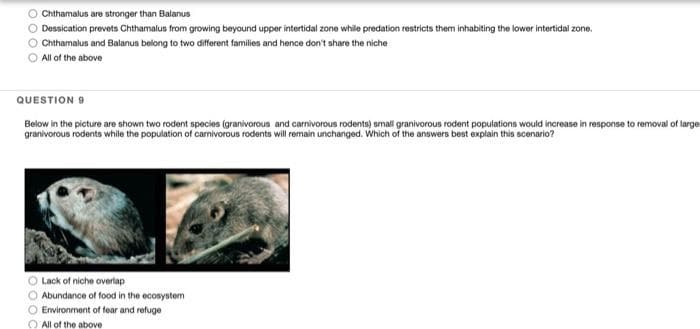Chthamalus are stronger than Balanus Dessication prevets Chthamalus from growing beyound upper intertidal zone while predation restricts them inhabiting the lower intertidal zone. Chthamalus and Balanus belong to two different families and hence don't share the niche All of the above QUESTION 9 Below in the picture are shown two rodent species (granivorous and carnivorous rodents) small granivorous rodent populations would increase in response to removal of large granivorous rodents while the population of carnivorous rodents will remain unchanged. Which of the answers best explain this scenario?
Chthamalus are stronger than Balanus Dessication prevets Chthamalus from growing beyound upper intertidal zone while predation restricts them inhabiting the lower intertidal zone. Chthamalus and Balanus belong to two different families and hence don't share the niche All of the above QUESTION 9 Below in the picture are shown two rodent species (granivorous and carnivorous rodents) small granivorous rodent populations would increase in response to removal of large granivorous rodents while the population of carnivorous rodents will remain unchanged. Which of the answers best explain this scenario?
Biology: The Unity and Diversity of Life (MindTap Course List)
15th Edition
ISBN:9781337408332
Author:Cecie Starr, Ralph Taggart, Christine Evers, Lisa Starr
Publisher:Cecie Starr, Ralph Taggart, Christine Evers, Lisa Starr
Chapter44: Population Ecology
Section: Chapter Questions
Problem 2DAA: Iguana Decline In 1987, Martin Wikelski began a long-term study of marine iguanas in the Galpagos...
Related questions
Question
Please answer asap and type your answer and do not copy from anywhere please
Q9

Transcribed Image Text:Chthamalus are stronger than Balanus
Dessication prevets Chthamalus from growing beyound upper intertidal zone while predation restricts them inhabiting the lower intertidal zone.
Chthamalus and Balanus belong to two different families and hence don't share the niche
All of the above
QUESTION 9
Below in the picture are shown two rodent species (granivorous and carnivorous rodents) small granivorous rodent populations would increase in response to removal of large
granivorous rodents while the population of carnivorous rodents will remain unchanged. Which of the answers best explain this scenario?
Lack of niche overlap
Abundance of food in the ecosystem
Environment of fear and refuge
O All of the above
Expert Solution
This question has been solved!
Explore an expertly crafted, step-by-step solution for a thorough understanding of key concepts.
Step by step
Solved in 2 steps

Knowledge Booster
Learn more about
Need a deep-dive on the concept behind this application? Look no further. Learn more about this topic, biology and related others by exploring similar questions and additional content below.Recommended textbooks for you

Biology: The Unity and Diversity of Life (MindTap…
Biology
ISBN:
9781337408332
Author:
Cecie Starr, Ralph Taggart, Christine Evers, Lisa Starr
Publisher:
Cengage Learning

Biology: The Unity and Diversity of Life (MindTap…
Biology
ISBN:
9781305073951
Author:
Cecie Starr, Ralph Taggart, Christine Evers, Lisa Starr
Publisher:
Cengage Learning

Biology: The Unity and Diversity of Life (MindTap…
Biology
ISBN:
9781337408332
Author:
Cecie Starr, Ralph Taggart, Christine Evers, Lisa Starr
Publisher:
Cengage Learning

Biology: The Unity and Diversity of Life (MindTap…
Biology
ISBN:
9781305073951
Author:
Cecie Starr, Ralph Taggart, Christine Evers, Lisa Starr
Publisher:
Cengage Learning